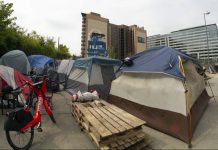By Noemi Arellano-Summer, Miriam Fauzia, Mikayla Heiss, Anran Xie, Ran Zhang, Sydney Hager, Emily LeClerc and Maggie Mulvihill
Published July 13, 2020
The March warning to cities from federal officials to pause clearing out homeless encampments to stem the further spread of COVID-19 spotlighted the grim public health problems that can fester within those sites.
Yet even as the alert came, seven Massachusetts cities designated by the U.S. Department of Housing and Urban Development as “Continuums of Care” to fight homelessness lacked any formal definition of what constitutes an encampment. Only one of those — New Bedford — had any written policy or procedure for assessing an encampment before cleaning it out or how a sweep should be conducted, a survey by Boston University journalism students found.
The lack of a clear encampment definition, when and how a cleanout will be done and what services are available to displaced occupants creates legal risk for authorities and further traumatizes displaced homeless individuals.
Costly class-action lawsuits in encampment sweep cases brought by the homeless have forced some cities to settle and adopt clear guidelines for carrying out cleanouts, including procedures for homeless people to retrieve confiscated personal items.
While some Massachusetts cities provide advance notice to occupants before a sweep, few, if any, inventory personal property taken or have a process to allow the homeless to retrieve items — even as encampments are a growing concern.
“It is fair to say, given the opioid issue, it is increasingly problematic,” said Lowell Director of Development Services Eric Slagle. Lowell lacks any definition or policies about encampments.
“It’s sort of ‘we know it when we see it,’ ” Slagle said.
There are roughly 15 homeless encampments in Lowell, though they are difficult to monitor because of the city’s topography and infrastructure, Slagle said.
“There are lots of spots where you have to balance beam your way into them — railroad tracks, highways, rivers,” he said.
There is no central repository tracking their location or health concerns.
“We are trying to change that,” Slagle said. “I think you have hit upon the crux of the problem.”
The city has funded a new homeless coordinator position as well as information and plans to centralize the information.
Homeless encampments vary widely by locale. One can include as few as three people or as many as 100 who have set up tents or other temporary shelter, as well as their personal belongings, outside on public property.
Since 2007, Massachusetts experienced a 22% rise in homelessness — the third-highest spike in the nation in that time period, according to a federal report.
Massachusetts, New York and the District of Columbia have “right to shelter’’ laws. In the Bay State, that means cities and towns must provide temporary emergency shelter to every man, woman or child who is eligible.
While 95% of homeless people in Massachusetts are sheltered, 829 people were living outside on the night of the annual homeless count in 2019, HUD data shows.
Encampments dot the Bay State. Authorities conduct regular sweeps to relocate individuals.
Boston’s first policy on dealing with encampments was released in October as part of a broader plan to tackle drug abuse and homelessness in a downtown area plagued by violence and crime.
The policy, which is under review, aims to improve the “public health approach to encampments” and “develop consistent citywide protocol for redirecting encampments.’’ Marty Martinez, the chief of the Boston Mayor’s Office of Health and Human Services said finalizing the protocol has been put on hold because the city had to shift all of its public health resources to managing the COVID-19 crisis.
Other cities that lacked legal definitions for encampments or written policies and procedures for conducting cleanouts include Cambridge, Lynn, Springfield and Worcester.
Worcester, Cambridge and New Bedford do give advance notice to occupants if they are going to conduct a sweep and will store some items taken for a period of time.
Arellano-Summer, Fauzia, Heiss, Xie, Zhang, Hager and LeClerc are from the Department of Journalism at Boston University.




